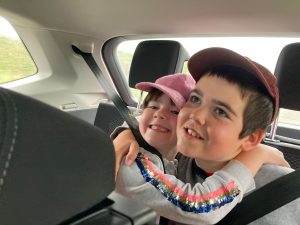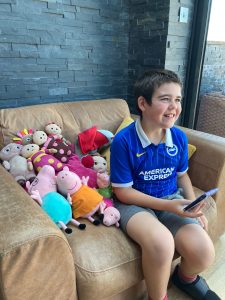Campaigners have responded to a report, which highlights for the first time, the desperation and anger of families trying to access medical cannabis in the UK.
Cannabis Health speaks to Dr Anne Katrin Schlag, head of research at Drug Science and campaigner, director of the Medical Cannabis Clinician’s Society (MCCS) and co-founder of Medcan Support, Hannah Deacon about the findings and the potential for change.
Eleven families of children living with severe epilepsy contributed to the article, published this week by Drug Science, which focuses on the wider issues surrounding medical cannabis such as cost, access and benefits to patients and family life.
The collection of data shows huge problems, particularly in the breakdown of trust between patients and their doctors and the desperation and anger felt towards the current system.
It also highlights for the first time the impact that having a severely ill child has on parents, carers and the wider family and how medical cannabis has improved things.
Cannabis report
Campaigner and mum to Alfie Dingley, who has treatment-resistant epilepsy, Hannah Deacon helped to recruit the families included in the report.
Alfie, who received the first permanent license for medical cannabis on prescription in the UK, is now one of just three people who have been able to access a prescription on the NHS.
Hannah hopes the data will help more doctors to better understand that cannabis-based medications can be used safely for patients.
“We’ve been using cannabis now with Alfie for four years and I realised that what we are seeing is very valuable,” Hannah tells Cannabis Health.
“I saw my child being extremely ill and I was told by doctors that he may not live. We were told we would have to pump him full of steroids, which can cause heart failure, liver disease and psychosis. Then when Alfie stopped having seizures all the time, I thought, that’s amazing data. It’s evidence.”
She continues: “I didn’t realise that doctors don’t see that as evidence necessarily because it seems anecdotal. I even met a very well known doctor when we were trying to get the license who said that my son’s results were a placebo effect for me which is complete nonsense. He was having 150 seizures every week and spending most of his life in hospital, then he wasn’t.”
“I felt that data was really important and no one seemed to be collecting it. As a patron of Drug Science I approached them to ask if we could collect it. I was very lucky that they agreed to do that. It’s our children, our evidence.”
The study follows another more quantitive clinical analysis, published earlier his year by the charity, which found medical cannabis has a 96 percent chance of significantly reducing seizures in children with severe epilepsy.
This latest report focuses on the experiences and the human element of the medical cannabis system.
“It’s important to show the human element in this with the reduction of seizures and other issues around epilepsy,” said lead author of the report, Dr Schlag.
“We wanted to let the families speak about what they’ve experienced, what the issues are and what they are still experiencing. Hopefully, this will show how we can all work together to improve this situation.”
Dr Schlag continues: “It was very clear the kind of trauma the parents, families, carers and children are experiencing. There are so many issues involved in addition to the actual epilepsy so it’s important to have an article that can really show that.”

Care for carers
The report highlights that the mental health of parents and carers, as well as siblings, suffered as a result of having a severely sick child in the family.
Many parents reported that they had suffered from depression, anxiety and post-traumatic stress disorder (PTSD) as a result of their child’s condition. This was often coupled with a lack of support.
“I remember a neurologist saying to me that his job was to keep my son out of the hospital. As far as they are concerned, as long as you are not in hospital then they are doing their job,” says Hannah.
“But Alfie was on a huge amount of drugs with horrendous side effects and still having seizures. He had very violent and erratic behaviour. He would always need someone to care for him.”
Hannah says she felt ‘unseen in society’ as she became a full-time carer for her son. She says that parents don’t expect to be full-time carers when they have children and that the reality causes a lot of trauma. She stresses that there was nothing on offer for parents experiencing the mental health difficulties included in the article.
“There is a huge amount of grief and of trauma,” she continues.
“We were never offered consistent NHS mental health support. As long as we were kept out of hospital then it didn’t matter what my son’s quality of life was like. It didn’t matter about mine or my family’s quality of life as it only mattered that we were not a burden to the NHS.”
Now that Alfie is no longer having seizures, Hannah has been able to return to work which has helped her to feel connected to society again. She explains the importance of the report lies in its ability to highlight the effect this has on the families involved.
This is an issue still neglected by policy-makers and excluded when it comes to discussions on benefits and risk assessments.
“This is why the report is so important because it highlights not just seizure reduction but the impact on finances, mental health and all the things that come with it,” she says.
“I feel that I’ve come into contact with many doctors that have a lack of empathy. I think that’s why using medical cannabis is such a patient-led force because poor families have had enough of being unseen and unheard. They want to do what’s right and to help their children to have a better quality of life.”

Medical cannabis report and education
Both Hannah and Dr Schlag hope the report helps to educate doctors on all of the benefits of medical cannabis.
Dr Schlag said: “This really contributes to opening doctors and nurses’ eyes, as this is evidence. I think the article also highlighted that the goal of medicine is to alleviate suffering and it’s about improving the quality of life for patients. Reduction of seizures is the key aspect but this shows that there are other positive outcomes for the patients as well as for the families.”
She adds: “Our aim is to work to make a broad variety of cannabis-based medical products available on the NHS in the future. Step by step in providing this evidence we are hopefully making the progress that has been promised to patients since 2018 when it was legalised. The progress has been poor and we are working to improve that.”
Hannah is in agreement.
“It’s about hope. I hope doctors will take a look at this and the NHS approach,” she says.
“Cannabis is different [to conventional pharmaceuticals] and it’s about quality of life and reducing harm for people who have a chronic illness. I hope this report will go some way to help doctors understand this is a holistic approach of applying the medicine.
“The government promised that this would be widely available and that policy has failed. There are only three prescriptions for whole plant cannabis on the NHS. That’s not right or fair.”
Hannah adds: “I’ve seen the change in my son for four years since he has been on this medicine, I’ve only seen positive outcomes. That’s a good study that’s long enough to show that this is safe for him. Therefore it should be safe for many other people with epilepsy.
“I do believe things will change and reports like this will encourage doctors to prescribe because I think once a few prescribe in the NHS then the dam will break and that’s really exciting. It will only happen because of reports like this.”
The post “Families have had enough of being unseen and unheard” – Campaigners react to landmark medical cannabis report appeared first on Cannabis Health News.

